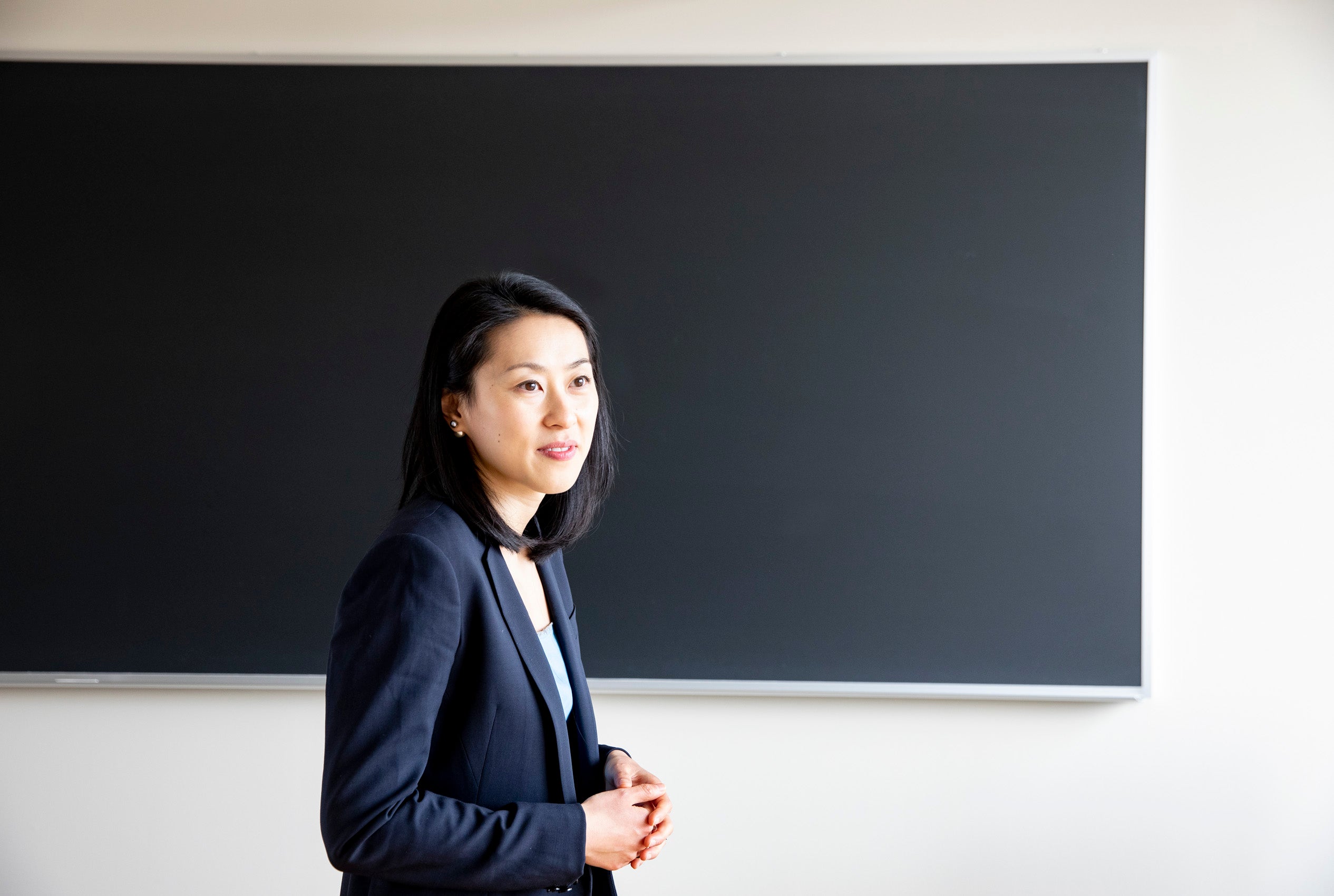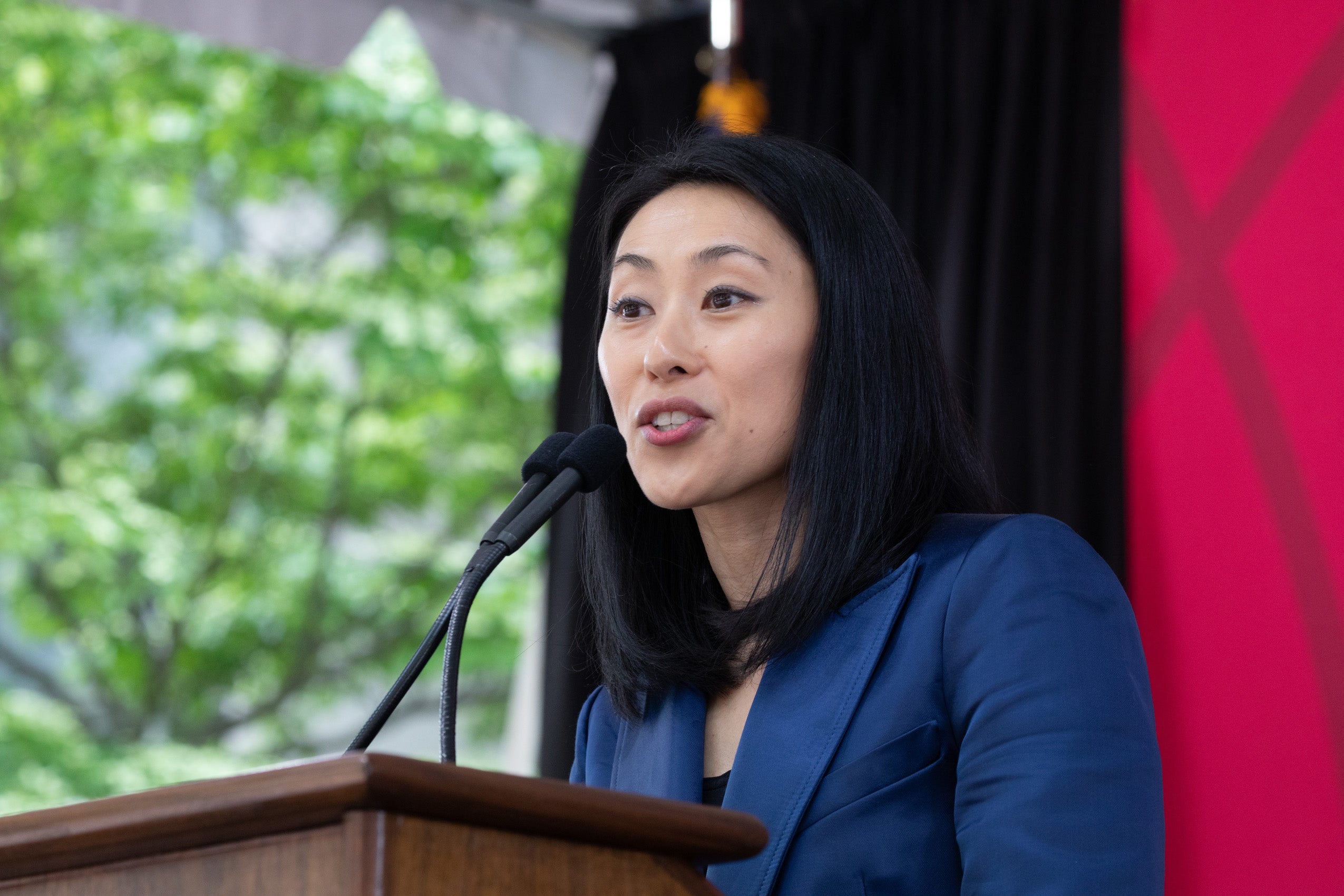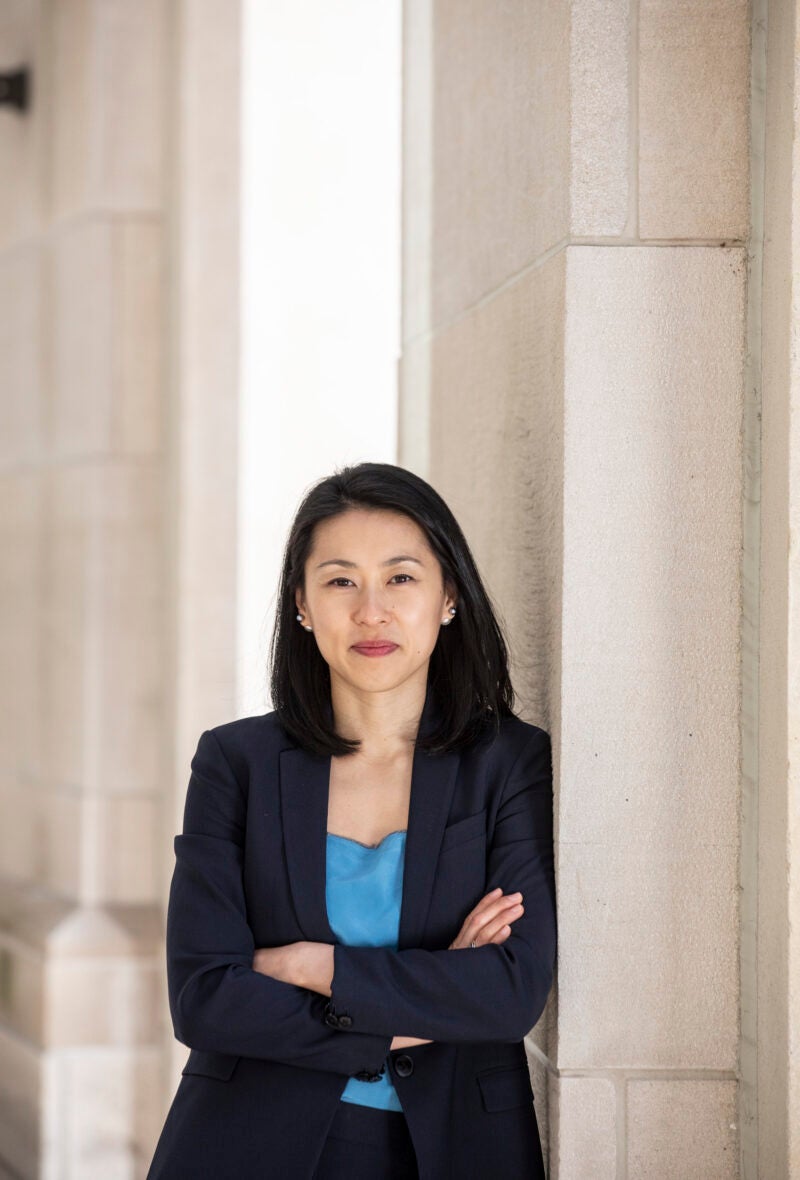As a teen, Crystal S. Yang ’13 flew through her high school’s chemistry curriculum, graduating to college classes in her junior and senior years. She loved chemistry’s methodical way of making sense of matter, and she was certain she was destined for a life in the lab.
Twenty years later Yang has traded her lab coat for the law and economics, but her passion for bringing a systematic approach to her understanding of the world is central to her current work and research involving a range of pressing social issues. Yang’s deep analyses have shined a light on the problem of inadequate health care for incarcerated individuals, the unintended spillover effect of immigration enforcement on Hispanic citizens, the effect of Chapter 13 bankruptcy protection on financial health, the equitable use of algorithms in the administration of criminal justice, and more.
But the bulk of Yang’s work has focused on the nation’s pretrial detention and bail systems, which have disparate impacts on disadvantaged communities — and on finding the empirical evidence that can support reform.
“In the United States so many of our policies, when it comes to incarceration, sentencing, pretrial, you name it, are just not backed by actual evidence, or are actually contrary to what the best evidence tells us,” said Yang, Harvard Law School’s Bennett Boskey Professor of Law, and a research associate at the National Bureau of Economic Research. “I always found it exceedingly problematic that we would have these incredibly punitive, far-reaching institutions where the rationales for those institutions are not actually supported by rigorous evidence.”
“So many [U.S.] policies, when it comes to incarceration, sentencing, pretrial … are actually contrary to what the best evidence tells us.”
Yang’s bail and pretrial detention work was directly inspired by her time with the U.S. Attorney’s Office for the District of Massachusetts before she joined the law school faculty in 2015. As part of the office’s criminal appeals unit, she briefed and argued several cases before the 1st Circuit, as well as investigated and prosecuted drug trafficking crimes. During the 12 months she was there, Yang’s economist mind was always in motion. “When I saw something really striking, my first thoughts were, How could I test this? Is what I’m seeing a one-off, or is this actually a systematic pattern that one could see if there were data, and where would I get that data?”
Soon she honed her focus. In court for regular hearings, Yang gradually began to understand that a judge’s discretion often took hold well before sentencing began. “I realized things related to discretion and disparity were happening much earlier in the process, things I felt were empirically relatively understudied, like pretrial detention and bail,” she said.
Yang’s numbers are striking. Her 2018 paper with Will Dobbie and Jacob Goldin tracks how the random assignment of a lenient judge or one who is more inclined to deny pretrial release affects a defendant’s future. By linking the data of more than 420,000 criminal defendants from two large urban counties — Miami-Dade and Philadelphia — to administrative court and tax records, they found that those held in jail prior to trial for even three days were 9.4% less likely to have formal employment three to four years after their detention compared with those released before trial. In a follow-up paper from 2021 titled “The Economic Costs of Pretrial Detention,” Yang and Dobbie built on their 2018 data, outlining how pretrial detention results in the long-term loss of almost $30,000 in earnings and social benefits. Separation from family, the loss of employment and housing, and increases in poverty are among the other long-term negative consequences associated with pretrial detention, they found, as are many lasting effects on future generations. “Counties with high levels of pretrial detention also exhibit significantly lower levels of intergenerational mobility among children,” they write, “consistent with pretrial detention having an adverse impact on young children who may be the dependents of individuals affected by the pretrial system.”
In a 2020 paper, Yang and Dobbie also offer ways to eliminate racial bias in predictive algorithms, data-driven computer models that forecast future criminal behavior and that are increasingly used to inform pretrial detention decisions.
More recently, Yang has been studying how to help judges predict how likely a defendant is to engage in misconduct — from committing a new crime to missing a court date — if released while awaiting trial. Specifically, she has been weighing whether a predictive algorithm is more accurate than a judge. In a forthcoming paper, she finds that, among judges in her sample who use their discretion to override the algorithm, 90% underperform the computerized recommendations, while 10% outperform them in terms of accuracy and fairness.
The work suggests that skilled human decision-makers still have an important role to play in high-stakes decisions, Yang writes, and that the best path forward may be one in which judges using algorithms as one important tool can generate the best release decisions.
“Given large technological advances in both society and law, understanding how best to combine human and machine insights is critical for advancing welfare,” said Yang.

Finding her way at Harvard
Yang’s “life-changing” time in Cambridge began almost 20 years ago, when she arrived on campus in 2004 with a plan to study chemistry. But during one of her first-semester classes, when she was packed into Sanders Theatre with hundreds of other students studying how economics affects everything from health care to global warming, something clicked. “I just loved that class,” Yang recalled. “It was the use of analytical tools but applied to real-world issues or social problems that I found so interesting because it involved people in a way that the sciences hadn’t for me up to that point.”
Yang received her bachelor’s degree in economics and master’s degree in statistics in 2008, and she credits one of her Harvard mentors, economist Claudia Goldin, with encouraging her to pursue a Ph.D. “She was deeply interested in studying racial and gender inequality, and that just drew me in,” said Yang. “It felt so fundamental to what we should be trying to do in the United States, helping people have equal opportunities regardless of their background or where they’re from.”
Yang’s interest in equality is deeply tied to her family’s experience. Her parents left China for the United States more than 30 years ago in search of better opportunities, in particular for their only child, a young daughter, just 5 years old.
Both had had successful careers in Beijing — her father was an engineer, and her mother was an ophthalmologist — but they chose to permanently relocate, Yang recalled, “to give me a better life, and a chance to do the things that I was passionate about with no limits.” Watching them try to adjust to a new country, a new language, and a new culture, left a lasting impact.
“I suspect my current field of interest is tied directly to the experience of seeing my parents, who had so much to offer, face barriers that made it so difficult for others to recognize everything they have to contribute,” said Yang. “They basically had to start over.”
Helping others overcome challenges and applying economic principles to the law are the throughlines in Yang’s academic work that crystallized at Harvard. As a doctoral student in economics, she realized that many of the causes and consequences of inequality and poverty in America she saw were “tied to legal institutions.” When Steven Shavell, the Samuel R. Rosenthal Professor of Law and Economics at Harvard Law School, another important mentor whom Yang had worked for as a research assistant, encouraged her to get her J.D. and Ph.D. and “really think about being an economist at a law school,” Yang listened. She graduated with a Ph.D. in economics and a law degree from Harvard in 2013.
Paying it forward
Today, in addition to her research, Yang loves teaching (she was honored with the law school’s Albert M. Sacks-Paul A. Freund Award for Teaching Excellence last spring), learning from her students, and acting as a mentor and guide to help them shine.

Her energy and enthusiasm were on full display in August when a group of first-year students crowded into a room in Wasserstein Hall. For an hour, Yang highlighted the importance of class outlines and where to find them, how to take notes, use a computer in class, prep for exams, and, critically, schedule breaks. It was an impressive list of helpful hints from someone familiar with the demanding schedule of a 1L, and committed to helping others succeed.
“My aspiration is to be a mentor to these students,” said Yang, “because I know how fortunate I was to have really important people at these critical moments of my life who helped shape and guide me in both economics and the law, and that my life was so deeply changed by Harvard.”
